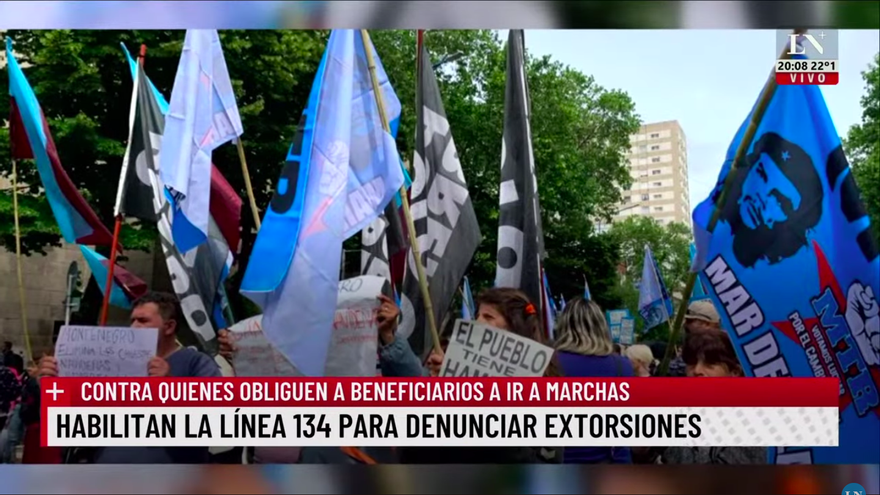
![]() 14ymedio, Havana, 19 December 2023 — The Argentine Minister of Security, Patricia Bullrich, confirmed on Monday that the Administration of Javier Milei “is working” to identify and dismantle groups of Cuban and Venezuelan agents who have instructions to sow chaos in Argentina. During an interview on national television, the politician referred to the “protocol” that the State must follow in these “performances” but avoided offering details.
14ymedio, Havana, 19 December 2023 — The Argentine Minister of Security, Patricia Bullrich, confirmed on Monday that the Administration of Javier Milei “is working” to identify and dismantle groups of Cuban and Venezuelan agents who have instructions to sow chaos in Argentina. During an interview on national television, the politician referred to the “protocol” that the State must follow in these “performances” but avoided offering details.
The presenter, Eduardo Feinmann, asked Bullrich on a program of the newspaper La Nación to comment on Milei’s plan against drug trafficking and crime, reported last Sunday by journalist Joaquín Morales Solá. “There are Cuban and Venezuelan agitators in the country, willing to help the local rebels in their vandalism. They plan to reproduce here the 2019 social outbursts in Chile (against the government of Sebastián Piñera),” he said, citing a government source whom he did not identify.
These groups, which in Argentina are known as piqueteros (picketers), called for new demonstrations against Milei for this Wednesday. Argentina has a special vulnerability, says Morales, because former presidents Alberto and Cristina Fernández “cleared out the security supplies” of the country, so the police have “only one water truck to dissolve eventual uprisings.”
They are not marching; they are picketing: they go, they block the street and they don’t let anyone pass,” he said. “Our decision is to put order in the streets
During his interview, Bullrich alluded to these agents as “a noisy minority,” which usually leads 8,000-10,000 protests annually. “They are not marching, they are picketing: they go, they block the street and they don’t let anyone pass,” he said. “Our decision is to put order in the streets (…). We need to work together with the country’s police. The protocol is an order to the security forces to act. It is within the legal frameworks and the Criminal Code,” the minister clarified.
Although he refused to detail the specific strategy against those who receive guidance from Havana and Caracas, Bullrich was blunt about the piqueteros: those who act as “instigators” will receive the full weight of the law.
In 2019, after the protests in Chile, the government of that country expelled 50 foreigners, including 30 Cubans and nine Venezuelans, who were involved in violent acts during the demonstrations, as reported at the time by the government of the O’Higgins region.
“Violence, without a doubt, has been the worst face of the demonstrations recently recorded in Chile, and the O’Higgins region has experienced this reality, despite the call of different sectors, including the citizenry themselves, to put a stop to these actions and promote a social agenda that meets the legitimate demands that triggered the crisis in the country,” explained an official statement.
“Out of a total of 50 foreign citizens, five were arrested and brought to justice for looting and being involved in disturbances, attacking authority and erecting barricades,” adds the government’s statement.
Cuba executes a strategy of interference in Colombia through the direction of Cubans with diplomatic coverage in social solidarity organizations
A similar situation occurred in 2021 in Colombia, during the Administration of Iván Duque. Without specifically mentioning Cuba, the president said at the time that he would proceed to “the expulsion, in accordance with the Vienna Convention, of those who intend, in the exercise of the diplomatic function, to come to our country to try to interfere in the healthy development of the Colombian institutional course.”
Duque’s statement came in reaction to a publication in the Colombian magazine Semana about a report prepared by officials on a plan of the Cuban Government to interfere in the Colombian elections of 2022 and “destabilize the country.”
“Cuba executes a strategy of interference in Colombia through the direction of Cubans with diplomatic coverage in solidarity organizations, the infiltration of cooperation programs with local authorities and their financing through the ELN (National Liberation Army),” he says in the document “Strategy of Cuban interference in matters of independence and sovereignty of Colombia” prepared by Colombian Government agencies.
“The authorities identified that Cuban tentacles have an interest, sympathy and a close relationship with a candidate for the Presidency,” the magazine said, with sources close to the Colombian Executive. The common factor of the groups in Chile and Colombia was their link with the Cuban Institute of Friendship with the Peoples, based in Havana, which is still under the command of former spy Fernando González Llort.
Translated by Regina Anavy
____________
COLLABORATE WITH OUR WORK: The 14ymedio team is committed to practicing serious journalism that reflects Cuba’s reality in all its depth. Thank you for joining us on this long journey. We invite you to continue supporting us by becoming a member of 14ymedio now. Together we can continue transforming journalism in Cuba.
